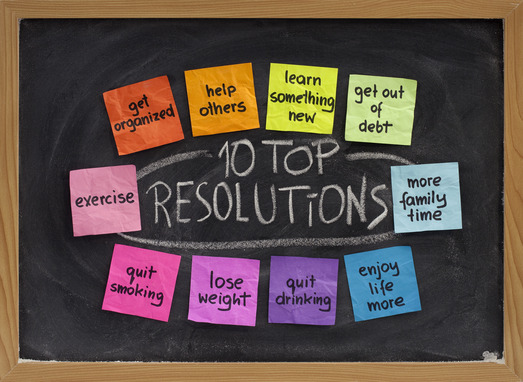
Do you get halfway through January and feel like you’ve already failed at your new year’s resolutions?
Impossible! If you’ve ‘already failed’, then you’re simply not doing your goal setting, habit change, or new year’s resolutions right. But you can fix that.
Here’s how.
3 Lessons for Achieving Goals, Changing Habits, and Making New Year’s Resolutions That Stick
1. It Takes 21 66 Days to Change a Habit
In a study of people attempting to change diet and exercise habits, it took between 18 and 245 days for the new behavior to feel automatic. The duration varied by person and habit, but the average was 66 days.
So 66 days is a good indicator when planning your own goal, habit change, or new year’s resolution.
That means you need to allow at least a couple of months to get used to exercising, living without cigarettes, getting organized, stopping an anger habit, or whatever else is on your goals list.
Not 3 days, after which many people give up, feeling virtuous for having ‘tried’.
Not even 21 days, as the conventional wisdom suggests.
But 66 days.
Lesson: If you’ve been working on your goal, habit change, or new year’s resolution for less than 66 days, you’re not done yet.
2. You Need to Focus on Willpower What’s Achievable
Studies by the psychologist Baumeister suggest that willpower may be a limited resource – meaning it can be overtaxed and depleted.
It seems that trying to exert perfect control over behavior may sabotage your efforts in the long run. You ‘exhaust’ your self control, which can lead you to splurge or binge. Sounds familiar, right?
Hmmm… So failed willpower may not mean you have a fundamentally flawed and detestable character. It could mean you’re pushing too hard.
A better strategy, then, might be to lower your expectations and go for persistence instead.
- Rather than: I’ll exercise every day for 60 minutes
opt for: I’ll walk for 20 minutes on Mondays, Wednesdays, and Fridays. - Rather than: I’ll give up chocolate completely (wait, WHAT?)
opt for: I’ll have 20% less than I normally have. - Rather than: I’ll spend 2 hours every night getting organized
opt for: I’ll spend 30 minutes a week or 5 minutes a day on organizing tasks.
Once you achieve that, you can up the ante.
And the rest of the time, you can stop obsessing.
Lesson: If you oscillate between monastic willpower and flagrant bacchanalia, aim for something more achievable, and stick with it.
3. If You Miss a Day, It’s All Over It Makes No Difference
Another finding from the health habits study was that a day’s lapse was immaterial to successfully changing a habit.
Forget the all-or-nothing, black-and-white, on-or-off-the-wagon thinking that makes us give up at the first setback. Turns out we can be human, fail occasionally, and still manage to achieve our goals.
Lesson: If you drop the ball today, pick it up tomorrow.
Over to You…
What are your goals, habit changes, or resolutions for the new year?
How can you adjust your plans based on these 3 lessons from psych research?

"Successful New Year's Resolutions: 3 Things You Must Know To Achieve Goals and Change Habits | Get Organized Wizard" http://hub.tm/zAIPQ
Wow 66 days huh? Makes sense since the few times I’ve made it that long while changing behavior it has really stuck.
#2 is what I’m working on now. I’m an “all or nothing” girl. I think this is the hardest part for me. My goal I’m working on now is maintenance of my home. I can clean, I just don’t do daily maintenance so I get overwhelmed very easily.
#3 is a work in progress being that I’m an all or nothing girl.
★ Successful New Year’s Resolutions: 3 Things You Must Know To Achieve Goals and Change Habits ★ http://is.gd/6bwD6
My biggest goal for this year, and in fact my only “real” resolution, is this: every morning before I get out of bed, get myself into a state of gratitude. That’s it! Doing pretty well so far, have forgotten a day here or there. I definitely notice a difference on the days I remember – all the other things I want to achieve seem a little easier, whether it’s taking care of my body, my business, whatever.
I’m glad to know that it takes 66 days to change a habit, AND that missing a day really doesn’t make a difference, that picking it up again the next day is all it takes – thanks! It’s a good reminder to be a little more patient with myself and keep on keeping on.
★New Post★ Successful New Year’s Resolutions: 3 Things You Must Know To Achieve Goals and Change .. http://bit.ly/8wjRFc
Get Organized Blog | Successful New Year’s Resolutions: 3 Things You Must Know To Achieve Goals and Change Habits:… http://bit.ly/8wjRFc
RT @MicheleConnolly: ★New Post★ Successful New Year’s Resolutions: 3 Things You Must Know To Achieve Goals and Change ..http://bit.ly/8wjRFc